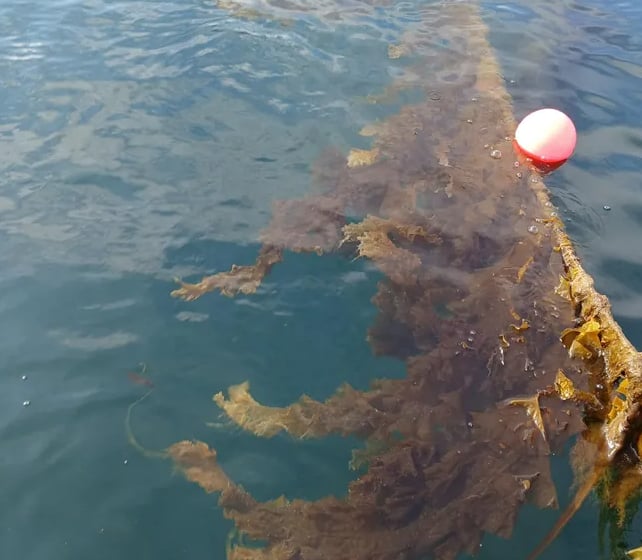November 27, 2025 | 04:45 GMT +7
November 27, 2025 | 04:45 GMT +7
Hotline: 0913.378.918
November 27, 2025 | 04:45 GMT +7
Hotline: 0913.378.918

Seaweed can prevent pollution by utilising excess nutrients for growth.
Scottish Sea Farms, a producer of farmed salmon, has teamed up with Atlantic Garden, a seaweed growing venture, in a scheme that trial the benefits of integrated farming on Loch Spelve, in the Sound of Mull. The aim of the year-long pilot project is to minimise the environmental impacts of the salmon farm, using the uptake of excess nutrients by seaweeds to achieve this.
The farm, which had previously been fallowed, was chosen as a suitable testing ground in the collaborative project, with seaweed lines being installed in October 2023. Having shown promising growth over the following winter period, the project will now move forward with the installation of four 90 metre salmon pens as the trial begins this month.
The benefits of integrated aquaculture projects are well known, as Scottish Sea Farms head of sustainability and development Anne Anderson points out.
“Seaweed is so beneficial in so many ways for the marine environment. As a plant, it absorbs carbon dioxide, while releasing oxygen. It’s a bit like planting trees to offset your carbon footprint. And some of the organic nutrients, nitrogen and phosphorous, from salmon farming are absorbed to help nourish the kelp. It will be interesting to see if we get more seaweed growth once we put the salmon in,” she said, in a press release.
Explaining the potential benefits to salmon farming, SSF area support manager Andrew MacLeannan said: “We will be looking to see if the seaweed trial has been successful from a salmon farming point of view by taking daily water samples, before and after the salmon are stocked, and checking for levels of plankton, which can impact the gills.”
Guy Grieve, founder of Atlantic Garden, aims to keep the seaweed crop in the water until summer to maximise the harvest, which could be up to 30 tonnes of biomass.
“We should get 8 to 10 kilos per metre of seeded line but this is a pilot so we don’t know what to expect yet. I look forward to what we learn from this trial and what our next steps will be,” he said.
(The Fishsite)

(VAN) A new study reveals how the simultaneous effects of ocean acidification, salinity and loss of oxygen are making the world more fragile.

(VAN) Hopes are growing that the creation of the first 3D turkey gut model could be a turning point in the battle against the virulent blackhead disease.

(VAN) Tyson, America’s biggest meat supplier, plans to shutter one of its largest beef processing plants as the industry continues to struggle with low cattle supplies and political pressure from Washington.

(VAN) New FAO study shows how digital solutions are empowering farmers and fishers to prevent losses and build resilient agrifood systems.

(VAN) Brazil's COP30 presidency pushed through a compromise climate deal on Saturday that would boost finance for poor nations coping with global warming but that omitted any mention of the fossil fuels driving it.

(VAN) Poultry farmers in the UK have been warned that they could face one of the worst winters yet for bird flu.

(VAN) Prices of main-crop paddy have risen sharply, with jasmine rice hitting 16,100 baht per tonne — the highest level in years.